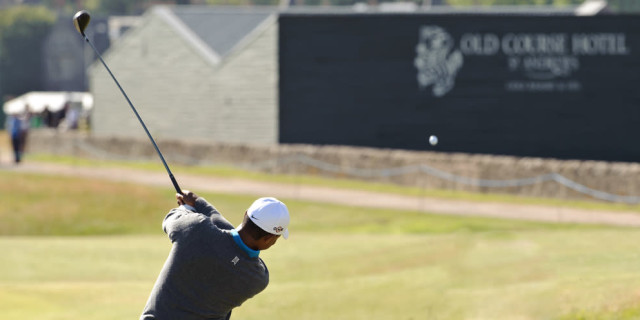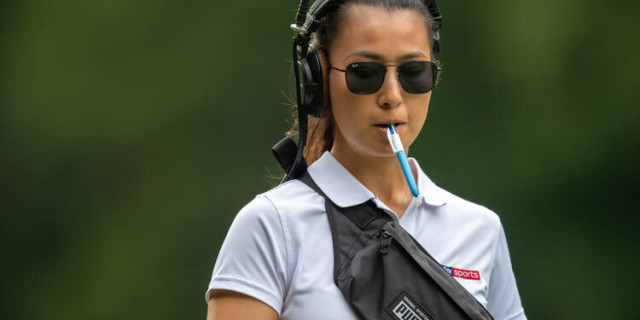
Golf Must Do More To Welcome ALL Races
YOU may be aware that October 2021 is Black History Month. Let me ask you a question: how many black golfers are there at your golf club? When Tiger Woods first emerged as a global force back in 1996 there was widespread hope that it would change the face of golf around the world. Sadly, it hasn’t happened.
Under normal circumstances, we would have expected to hear from Tiger this month but the 15-time major champion has other things on his mind as he continues to recover from the dreadful injuries he suffered in a car crash earlier this year. And it has to be said that he has drawn criticism in his homeland for not doing more to promote the sport among the black community.
Damon Hack, of the Golf Channel, said: "Tiger has been consistent in his unwillingness to ruffle feathers, cause controversy, take a side. That's what this moment needs, not necessarily taking a side but at least taking a stand. At least recognising that there are some issues that need to be addressed.
"I won't put it all on Tiger. He told us up front he wasn't going to give us much but that doesn't excuse the rest of the golf industry from being more proactive."
The History

Woods was not the first black golfer to win on the PGA Tour but the harsh reality is that he remains in a tiny minority. Astonishingly, Harold Varner III, Cameron Champ and Wyatt Worhtington are the only active African-American golfers on the PGA circuit.
Historically, black golfers were treated like second-class citizens on the PGA Tour. Charlie Sifford was a regular tournament winner but, shockingly, was never invited to play in The Masters.
It is not so long ago that the only black people allowed at Augusta were caddies. In fact, the organisers of The Masters insisted that the world’s best golfers used local black caddies during the season’s first major until 1983.
It was only in 1990 that Augusta accepted its first black member, a television executive called Ron Townsend, who had been refused membership at Shoal Creek. Shamefully, that golf club refused membership to any and all African-Americans.
Let’s not kid ourselves that matters are any better in this country. In England, about 2% of golf club members are from ethnic minorities. How can that be the case, especially when you learn that 14% of the UK population are from BAME backgrounds?
Searching For Solutions
To be fair, England Golf is attempting to address the issue with a number of community-related initiatives. The aim is to make golf more inclusive and create opportunities for children from all backgrounds to have the chance to try the game.
The R&A has appointed Niall Horan’s Modest Golf in an effort to make the game more attractive to younger golfers, and in 2018 the sport’s governing body launched a charter designed to get more women playing the game.
There has also been plenty of lip service to the need to do something to attract young black boys and girls but the shocking participation numbers tell you everything you need to know - it simply isn’t working.
After the death of George Floyd last year, the R&A admitted that its previous focus had been largely on women, girls and disability, and it announced that it was setting up a working party to address how it can remove racial barriers and encourage more black people to play golf.
Personal Stories
Jas Athwal, who organises the annual UK Asian Open, has experienced discrimination at first hand. He told BBC Sport: "I still recall, it makes me laugh now, when I turned up at a car park and the professional came out to the car and knocked on my door. He said, ‘Can I help you?' and I said, ‘No, I get out of my car every day on my own’.
"He wouldn't let me get out of my car. He said, ‘You're not a member'. And I said someone had invited me who was a member. They had to go and find that person to validate the fact that I was there.
"Over the years, you turn up at golf clubs and you see people's curtains twitching and looking out and thinking 'nobody's ordered a taxi or a takeaway here, what's this guy turned up for?’
"Those are the barriers. It's very hard to change that attitude. I don't know what the fear is. All we want to do is go and play golf.”
James Kamte came through the qualifying school in to earn full playing rights on the European Tour for the 2008 season - the first black South African golfer to do so since Vincent Tshabalala in 1976. Kamte finished in 138th place on the order of merit but won the Sunshine Tour’s Dimension Data Pro-Am in January 2008.
Today there are no black golfers on the European Tour - and that simply cannot be right.

Last year, former LET player and current Sky Sports broadcaster, Inci Mehmet called for more programmes to increase diversity in golf and questioned why there are not more black golfers at the highest level of the sport.
Mehmet was responding to comments made by Lee Westwood about the sport's handling of the Black Lives Matter campaign and questions surrounding how golf can be more accessible.
Westwood said that golf was "still perceived as a white activity” - and he is correct - and said that the sport "must be for all people", while Mehmet believed there remains a lack of opportunities for those from ethnic minorities to take up the game.
Mehmet said: "The global dominator of golf, my hero, Tiger Woods, is a black golfer, so I struggle to understand, to be honest, why we don't have more black golfers. It's a vicious circle and there needs to be more programmes put in place to make golf more accessible, because it's still quite an elitist sport.
"It's not easy to join a club, it's not easy to buy a set of golf clubs, it's not cheap. It needs to be more accessible for starters and we need to have programmes that provide other people with greater opportunities.
"If we look at golf in the UK, we still don't have enough people from the minorities that are members of golf clubs. There needs to be something put in my place for golf as a sport, stereotypically an elitist sport, to be more accessible."
Zane Scotland is a golfer who knows all about racism.
In 2020 he said: "I'm from black descent; my dad is black, and my mother is Irish Caucasian. It's been an interesting journey in golf, and I actually experienced a fair amount of racism in the golfing fraternity.
"Guys didn't know that I was half black, and they would make certain comments and I'd have to walk away to go to the bar, or to the toilets. Then they'd be told my dad was black, and they'd suddenly go from very white to very red through embarrassment.
"I reckon there have been at least seven occasions when someone has actually called me in my hotel room to apologise for their comments and promised never to do that again.”
Things Are Changing
But Scotland is optimistic that things are changing for the better.
"When I started to go to golf courses with my dad, it was obviously very noticeable that it was predominantly white male dominated," Scotland added. "And even as a kid, you had to have a suit and tie to go for an interview to get into a golf club, and I wasn't even allowed to join a club until I was 14.
"So we've seen the game evolve, and now younger kids are being allowed in to most clubs. It's evolving all the time, and hopefully we'll see a lot more young black kids getting into golf.
"The way to deal with racism is to realise that we're all one race, but the situation is improving, I think. It was not the norm to see a group of black golfers out on the course when I first started playing, but you see it all the time now, so that's fantastic. My dad was always well known for being the one black member at his golf club, but now he's better known for the loud trousers that he wears, and various pairs of bright shoes in all sorts of colours.
"He's not regarded as just the lone black guy who happens to play at our club, and that sort of thing is definitely on the way out now. In the time that I've been involved in golf, it is certainly improving."
Things may be improving but it is abundantly clear that much work still needs to be done.
Tags: GOLFERS Golf daily picks









